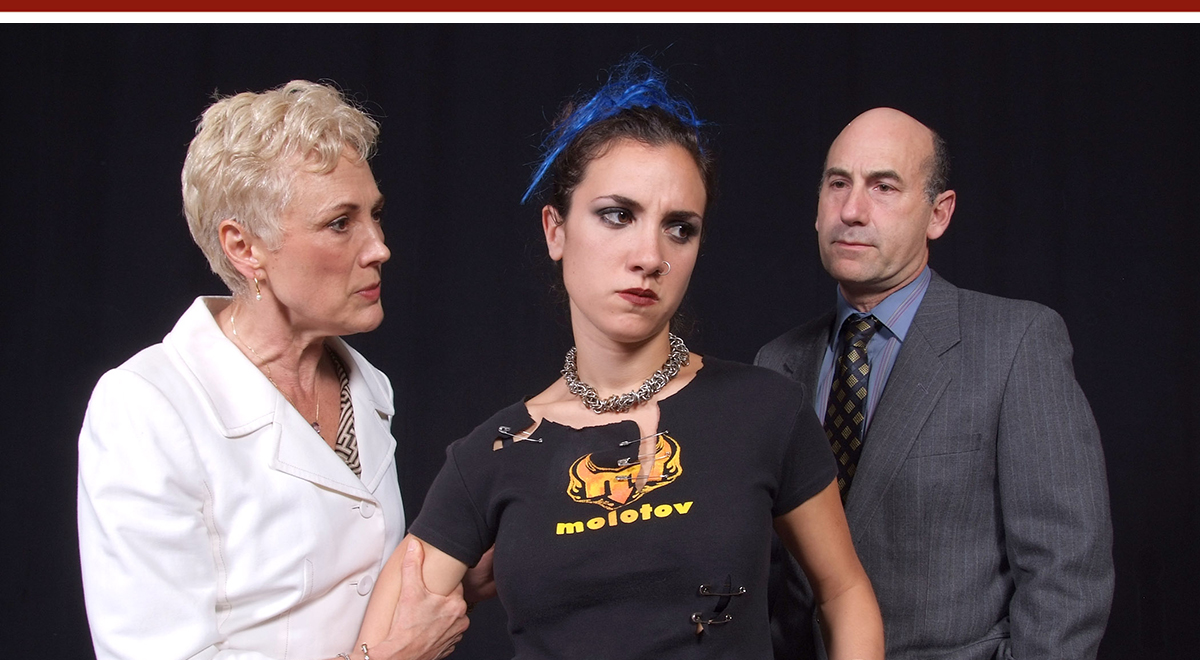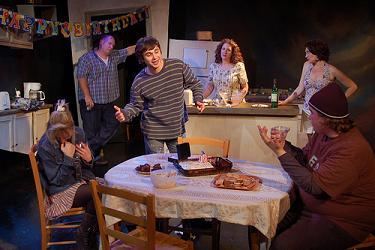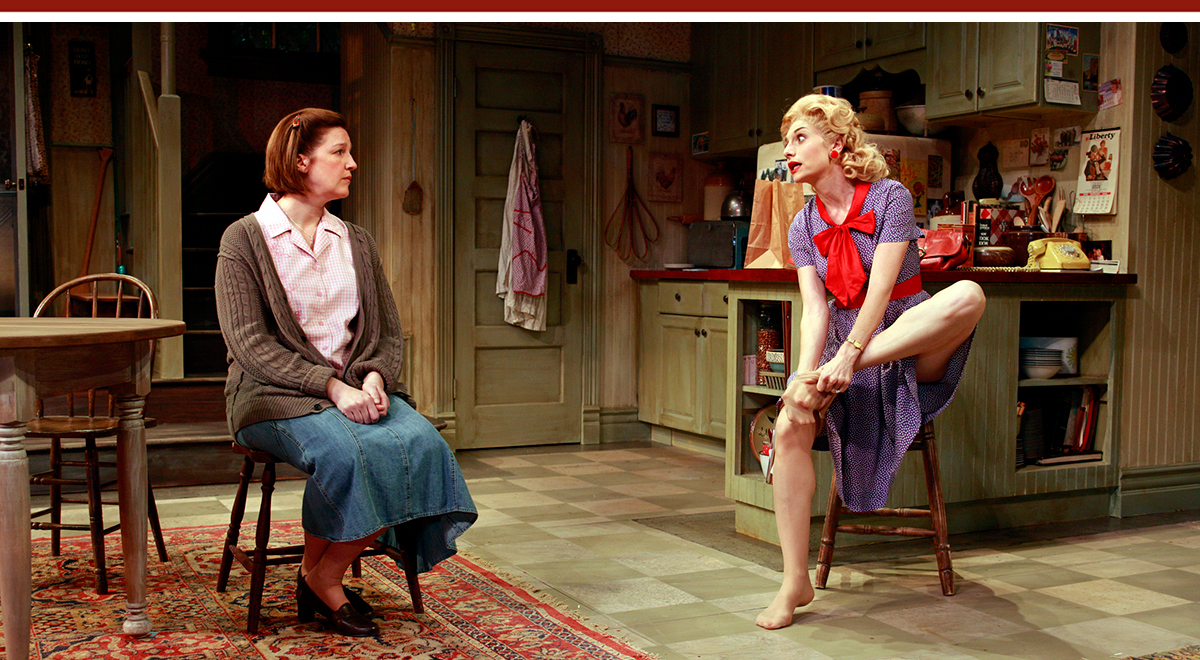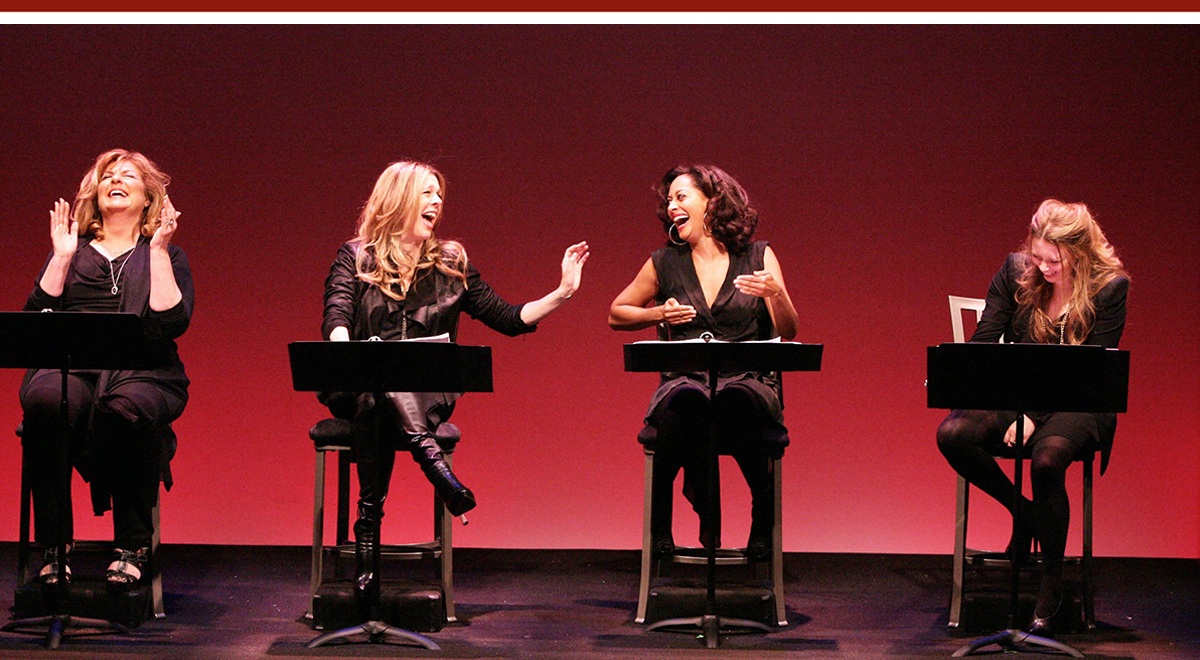MAY 2010
Click title to jump to review
BEHIND THE GATES by Wendy Graf | Marilyn Monroe Theatre
CRIMES OF THE HEART by Beth Henley | South Coast Repertory
LOVE, LOSS AND WHAT I WORE by Nora and Delia Ephron | Geffen Playhouse
SUPERNOVA by Timothy McNeil | Elephant Theatre Company

Unorthodox
Stories of troubled young women disappearing into male-dominated cults usually center around messianic Americans like Jim Jones, Charles Manson or David Koresch. In Behind the Gates, Playwright Wendy Graf follows a distraught American teenager into the heart of Jerusalem’s Mea Shearim district, to blow the yarmulke off an ultra-orthodox Jewish sect whose strict service to God demands binding servitude to husbands.
Graf, known locally for the award-nominated Leipzig and The Book of Esther, introduced the subject in her 2009 one-person one-act, Bethany/Bakol. In the full-length version, under the direction of David Gautreaux, a remarkable opening monologue gives way to a less compelling play, as if the original one-act was annexed by new territory rather than expanded organically.
In this solid, unflinching world premiere at the Marilyn Monroe Theatre (through July 3), produced by Hatikva Productions in association with the Lee Strasberg Creative Center, we hear Bethany Lieberman (Annika Marks) tell her version of life as the 17-year-old only child of Susan (Keliher Walsh) and Jerry (James Eckhouse). The Liebermans sit in frozen tableau with a family therapist (Oren Rehany) as Bethany circles, screaming invectives about how they are both overbearing and superficial. She contemptuously tells how, in a final effort to break her down, they sent her to Mea Shearim.
Graf smoothly moves Bethany’s narrative to Jerusalem. There, out from under her hateful parents’ gaze, she quickly embraces the ultra-orthodox life. She describes the people as warm, committed, and caring – nothing like her minimally observant Jewish parents. Before our eyes, Bethany becomes Bakol, the name given to her. As she removes the heavy eye make-up, jewelry and torn clothing of the suburban rebel, she loses the anger, narrow-mindedness and selfishness. As she dons the loose, “modest” clothing, she also begins to glow with a wholly believable rebirth. She avows she is now Bakol, and will never return to her old life in America.
It’s a rare opportunity for an actor to command the pace, tone and arc of the first quarter of a production, and Marks does landmark service to Graf’s vision. (The role is scheduled to be performed by understudy Olivia Choate June 11, 12 and 13.) As dramatically as a fuel gauge arcing from E to F during a fill-up, Marks makes Bethany’s 180-degree turnaround not only convincing, but enormously moving. She manages to let us see what Bethany sees in the religious conversion without obscuring the girl we know is still inside her.
After that scene, Gates enters the parents’ story, which will occupy the remainder of the play. As we shift perspective, we also seem to shift genres, moving from a fascinating drama of psychological self-portraiture to a search-and-rescue drama. We leave Bethany and her direct-address monologue, for the observed action of the parents' efforts to locate her. It's hard not to want to see what's happening to this character who raised our curiosity, anger and, ultimately, sympathy. The storyline seems to deserve a Roshamon dimension to learn what Susan and Jerry thought they were doing. Aside from a little squabbling, some hand-wringing about guilt for needing to adopt in the first place, little time is spent on their development. Instead, we follow them to Israel, where they work with a number of sources to retrieve their daughter: Donald Stone (Tom Beyer) with the American Embassy, Ami Dayan, a free-lance investigator (Steven Robert Wollenberg), another woman from the sect (Robin Roth), and others played by Nicholas Mongiardo-Cooper and Rehany, with AJ Meijer substituting for him on some performances.
Of the other actors, Roth is particurly effective, as is Beyer as the ineffectual diplomat. Stephanie Kerley Schwartz designed the flexible set, which makes use of diaphenous drapes to iindicate locale. Sarah Register designed costumes, Angeline Summers-Marvel the lights, and Keith Stevenson the sound.
The subject matter the Liebermans unearth about Mea Shearim is fascinating, and potentially controversial, as they sift through layers of cultural, political and religious practice. However, the personal story, with its explosive depiction of hostilities along generational borders, feels abandoned in the shift. We want to return to Bethany and see the changes she’s going through. What is fascinating, and the first scene proves it, is how someone allows herself to become the pawn of a movement. Having Bethany vanish for the rest of the play may help us empathize with the parents’ loss, but it may exact a loss in the storytelling, too.
top of page
BEHIND THE GATES
by WENDY GRAF
directed by DAVID GAUTREAUX
MARILYN MONROE THEATRE
May 12-July 3, 2010
(Opened 5/15, Rev’d 5/22)
CAST Tom Beyer, James Eckhouse, Annika Marks, Nicholas Mongiardo-Cooper, Oren Rehany, Robyn Roth, Keliher Walsh, Steven Robert Wollenberg; u/s Olivia Choate, AJ Meijer
PRODUCTION Stephanie Kerley Schwartz, scenic director; Sarah Register, costumes; Ageline Summers-Marvel, lights; Keith Stevenson, sound; Adam Michael Rose, dialects; Katherine Haan, stage management
HISTORY Presented by Hatikva Productions in association with the Lee Strasberg Creative Center; An earlier version, Bethany/Bakol was produced in 2009 by James Carey for the Attic Theatre Ensemble in Hollywood. World Premiere
Keliher Walsh, Annika Marks and James Eckhouse
Ed Krieger
Sister hood
Crimes of the Heart, Beth Henley’s 1979 comedy about three Southern sisters reuniting on the eldest’s 30th birthday, earned the then-29-year-old playwright a Pulitzer Prize in 1981. Twenty-nine years later, and after developing three of Henley’s subsequent plays, South Coast Repertory has finally yielded to the allure of her most commercial work. Thanks to a beautifully realized staging by Warner Shook that finds the heart behind the hoopla, SCR has a production worth the wait.

What makes Crimes so enduring is Henley’s Southern-fried storytelling, which matter-of-factly injects the whacked-out into the routine. It’s a world where an aged horse doesn’t die of old age, but by lightening-strike. Where a woman takes her life, and takes a cat along for company. What makes SCR’s production so endearing is a cast of seven SCR veterans, two from Shook’s Broadway-bettering Last Night at Ballyhoo in 2004, who keep the craziness commonplace and the comedy grounded in emotional truth.
Blair Sams, a valiant Lala in Ballyhoo, anchors the story as Lennie. While there’s nothing funny about a woman left to observe her 30th birthday alone, Henley, Shook and Sams manage to find some humor in it. Lennie breaks cookie after cookie in a failed attempt to plant a birthday candle she can wish on. This humor-pathos balancing act will repeat successfully throughout the show. What Henley has done, without sacrificing any of the fun, is give us three interesting women making their biggest leaps of maturity, individually and in relation to one another, over a matter of days. Their relationships with men, all crucial to the changes but not dominant, range from the luckless (Babe's) to the countless (Meg's), to the lone (Lennie's).
Lennie lives with her grandfather, who she continues to care for. The trappings of Thomas Buderwitz’s kitchen set are a vintage that would make anyone feel old before her time. As the day and the play begin, the people closest to Lennie are unavailable. Her parents are dead, Old Granddad is in the hospital, youngest sister Babe (Kate Rylie) is in jail after shooting her husband, and middle sister Meg (Jennifer Lyon) is in Los Angeles pursuing a singing career. The one relative who does stop by is Cousin Chick (Tessa Auberjonois), on her way to bring Babe back on bail. But, especially in the show's only outsized performance, Chick can only make an unhappy birthday worse. Auberjonois' over-the-top busybody may get some knocks, but it is in fact a performance of tremendous control, aided by a hilarious 'do – Marie Antoinette by way of Supercuts.
The men of Crimes are calm by comparison. Doc Porter (Nathan Baesel, the other Ballyhoo veteran), was once involved with Meg and, though married, may still carry a torch. Baesel keeps Porter's intentions unclear, adding another bit of mystery to the story. Barnett Lloyd (Kasey Mahaffy) is an attorney appointed to represent Babe in her upcoming trial. Mahaffy plays it fairly straight, giving the alienated Babe both distance and a hint of something better down the road.
As the self-centered Meg, whose movie-star beauty made leaving smalltown Mississippi inevitable, Lyon adds another fine performance to her SCR credits. After giving the true touch of hilarity to SCR's Noises Off last year, she correctly creates a character who has never had to earn others' affection. Lyon makes Meg's changes especially subtle and believeable. And Rylie, so different from her coed in SCR's recent premiere of Goldfish, gives Babe the right mix of confusion and conviction.
Angela Balogh Calen adds costumes that help individuate the characters, including plain housedresses that indicate Babe’s successful husband is not spending money on her. Peter Maradudin designed the lighting, and Jim Ragland provides the music and sound.
If there's anyone out there who hasn't seen this award-winner, this is a great time to dive in.
top of page
CRIMES OF THE HEART
by BETH HENLEY
directed by WARNER SHOOK
SOUTH COAST REPERTORY
May 7-June 6, 2010
(Opened 5/14, Rev’d 5/15m)
CAST Tessa Auberjonois, Nathan Baesel, Jennifer Lyon, Kasey Mahaffy, Kate Rylie, Blair Sams,
PRODUCTION Thomas Buderwitz, set; Angela Balogh Calin, costumes; Peter Maradudin, lights; Jim Ragland, music/sound; Jamie A. Tucker/Chrissy Church, stage management
HISTORY Originally produced by the Actors Theatre of Louisville in February 1979; New York premiere at Manhattan Theatre Club, 1980; Pulitzer Prize
Blair Sams and Tessa Auberjonois, top; inset: Nathan Baesel and Jenn Lyon
Henry DiRocco
Biographical material
Love, Loss and What I Wore may divide audiences in the Geffen's Skirball Theatre as dramatically as a closet split between summer and winter wardrobes. First, this ‘collection of intimate stories’ read from scripts by a quintet of talented actors, may separate those who want a play from those happy with a star-studded reading. Second, these vignettes in which significant moments in women’s lives are informed by what they wore may wear on male attendance members who find it the theatrical equivalent of 95 minutes outside a department store changing room.
As in its New York premiere, originally staged by Karen Carpenter, director Jenny Sullivan has a flawless cast who bring extraordinary life to the seated presentation. Caroline Aaron, Carol Kane, Natasha Lyonne, Tracee Ellis Ross and Rita Wilson are not only excellent at making their stories engaging, they (at least in the opening week), listened to each other as if hearing each story for the first time. They shift between performing and watching, along with the audience, adding a communal vibe to this sharing of passion through fashion.
Nora and Delia Ephron created Love, Loss from the memoir of the same name by Ilene Beckerman, which she calls “a memoir that told about growing up in Manhattan in the 1930s, 40s and 50s through the clothes I wore.” Beckerman wrote the book, at age 60, so her children and their children would have a different kind of biography by which to understand her life. To this, the Ephrons added personal stories gathered from their mostly celebrated friends, who are acknowledged in the program. Kane reads the Beckerman sections, which form a sort of spine, while the others divide up all the rest of the stories of mother-daughter strife (from both sides of the divide), dating, school conformity pressures, the content-chaos of a large purse, a lesbian wedding, and so on.
Subject matter aside, the format lacks dramatic energy. The stories are told, not performed. Rarely is the action in the present tense, nor does it involve dialogue between actors. When a brief exchange does take place, as when Gingy (Beckerman's nickname) and her friend Dora discuss whether to marry Mr. Beckerman, there's a palpable increase in theatricality.
While Charles Isherwood allowed in his New York Times review that the show is “perfectly enjoyable for the stray men in the room,” some men may drift, and find the drive home as delicate as those times in the department store having to answer the perilous question, “Does this look good on me?”
top of page
LOVE, LOSS AND WHAT I WORE
by NORA EPHRON and DELIA EPHRON
based on the book by Ilene Beckerman
directed by JENNY SULLIVAN
original New York production directed by Karen Carpenter
GEFFEN PLAYHOUSE
May 10-July 3, 2010
(Opened 5/13, rev'd 5/14e)
CAST Caroline Aaron, Carol Kane, Natasha Lyonne, Tracee Ellis Ross, Rita Wilson (Through June 9; Second cast, with Lucy DeVito, Conchata Ferrell, Justina Machado, Rhea Perlman and Nancy Travis, runs June 9-July 3)
PRODUCTION Lap Chi Chu, lights; Young Ji, stage management
HISTORY Produced in association with Daryl Roth, who produced the original New York production at Westside Theatre
Caroline Aaron, Rita Wilson, Tracee Ellis Ross and Natasha Lyonne
Michael Lamont
Flight plan
Something dry and abrasive, like a nuclear wind coming off the Baby Boom, blows through Timothy McNeil’s Supernova. Part wistful comedy about one generation’s fading dreams and part cautionary tale about the harsh backlash from the generation it bore, Supernova balances its dramedy on the backs of two middle-aged women in need of affection.

However, hidden behind the scenery of Joel Daavid's star-swirl set, there is off-stage romance circling around the despairing Supernova. The script is a gift for McNeil’s wife, Bonnie, who is creating the meaty role of Mabel in Lindsay Allbaugh’s world premiere staging at the Elephant Theatre Company (through June 27). The playwright also plays Joe, the watch salesman who gives her hope for renewal in weeks of late night telephone conversations.
Middle age has hit the Davies’ Des Moines home hard, trapping Mabel between her grousing husband John (Tony Gatto) and disaffected son Kip (Edward Tournier). Like the pre-show soundtrack of Lovin’ Spoonful and Fifth Dimension hits, Mabel still runs on dreamy escapist fantasies. She believes in magic: that her husband, a joyless graveyard shift factory worker, will rekindle their lost romance on a vacation; and that her dope-smoking, neighbor-screwing son will be excited about ice cream and cake for his 18th birthday.
While the play isn’t particularly super or nova or stellar, it kicks at its familiar generational issues in way that manages to stir up interesting questions specific to this pivotal generation. Here, loosely liberal Sixties veterans have produced another diametrically opposed teenager. What's alarming, however, is that while he carries on the now-traditional embrace of "revolution,", it is not for the old-school Vietnam-era protest kind, but this new kind of paranoiad reactionary fervor that fuels militias and McVeighs. While McNeil makes Kip an intelligent spokesman for this thinking, there’s no one in the play who can discuss it with him, and a chance to flesh out that aspect and give Supernova real significance floats into space.
The play is really concerned with Mabel, who calls to order a $300 watch for Kip’s birthday present and reaches Joe, another Sixties veteran whose life has not been a happy one. Mabel will need several calls to decide to spend the money for the expensive “Supernova” model, and Joe’s and Mabel’s intense need for friendship will slowly lead to intimate revelations. They will grow closer, confess their sincere, audio-only love, and hatch a plan for Mabel to flee her loveless cage. Longtime friend and neighbor Fran Mortensen (Gina Garrison) is there as Mabel’s confidante, but her visits are really insecure prowls for Kip, with whom she is carrying on a secret affair.
The play has a tendency to languish. The extended stretches of mutual confidence between Mabel and Joe are less interesting than the more complex characters humping away in the Mortensen den. And, because the strongest actor is Tournier, his mean-spirited, militia-embracing hatred may have greater weight in the balance of ideas than McNeil wants. The sexy Garrison also makes Mrs. Mortenson intriguing, as she appears likely to have men lining up for attention but chooses to submit to the brutality of a 17-year-old dead-end kid. Her story complements Mabel’s in interesting ways. What created the stasis that holds her, Mabel, Joe, and John in place?
As Mabel, Bonnie McNeil must first establish herself as the family doormat and then slowly earn her self-righteousness. She does this well, and her playfulness with Joe is nicely rendered. Gatto’s one-dimensional John could probably use some depth, while Kelly Elizabeth and Joe Wiebe do well with the small roles as Kip’s pals. Elizabeth is a believable rich kid slumming with the charismatic Kip, while Wiebe’s Moe is the lumpy third wheel we know – or are – too well. Micah Cohen (alternativing with James Pippi) does well in the functional role of Joe's supervisor.
Daavid’s set and lights recall the swirling stars, floating clocks and irregular angles of the “Twilight Zone” intro – "a land of shadow and substance." A shelf-full of frozen timepieces establish the watch company, and also suggest that time is running out on people and generations alike. Eventually, Mabel will make the choice to change. Will fate put the wind at her back, or will she be blown back by hope-extinguishing bad luck? And will the answer to what she – and we – are made of arrive before that nuclear wind blows "lights out?"
top of page
SUPERNOVA
by TIMOTHY McNEIL
directed by LINDSAY ALLBAUGH
ELEPHANT THEATRE COMPANY
May 20-June 27, 2010
(Opened 5/22, Rev’d 5/28)
CAST Micah Cohen (alt/w James Pippi), Kelly Elizabeth, Tony Gatto, Gina Garrison, Bonnie McNeil, Timothy McNeil, Edward Tournier, Joe Wiebe
PRODUCTION Joel Daavid, set/lights; Louis Douglas Jacobs, costumes; Jack Arky, lights/sound; Edgar Landa, fights; Tom Stanczyk, asst. dir.; Shannon Simonds, stage management
HISTORY Produced by David Fofi. Tara Norris, associate producer World Premiere



